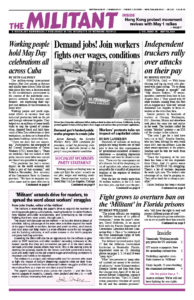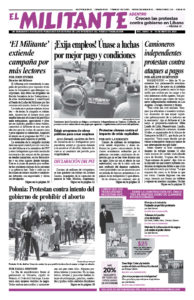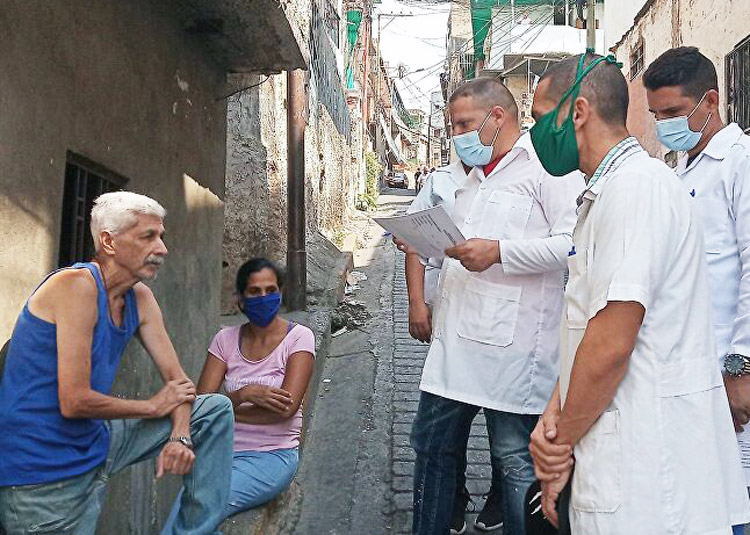Washington is not letting up on its sanctions and other violations of Venezuela’s sovereignty aimed at forcing the government of President Nicolás Maduro from power. “The United States is not done,” and will continue to squeeze harder, Secretary of State Mike Pompeo said April 23.
The U.S. rulers seek to capitalize on the economic and social crisis facing working people that has accelerated in Venezuela as a result of trade and financial sanctions, the impact of the COVID-19 outbreak and a steep drop in the price of crude oil.
Washington’s assaults in Venezuela are tied to its decadeslong war against the Cuban Revolution. Cuba has sent over 20,000 medical and other volunteers to serve there, in return for vitally needed shipments of oil. These shipments have been a special target of the U.S. capitalist rulers. Washington claims the Cuban volunteers are really disguised military forces propping up Maduro.
The U.S. rulers’ measures are forcing foreign companies and banking institutions to halt transactions with Venezuela in order to avoid U.S. retaliation. Caracas has been able to bypass some U.S. sanctions with the help of the Russian government, and to a lesser extent from the Indian, Iranian, Turkish and Chinese governments. Russian investment has helped stabilize Venezuela’s declining oil industry, and has been a lifeline exchanging gasoline and oil-processing chemicals for crude oil. However, state-controlled Russian oil producer Rosneft suspended operations there March 28 after being placed under U.S. sanctions.
The country has faced shortages of gasoline in the last couple of years, since the U.S. government escalated financial sanctions against Venezuela’s nationalized oil company PDVSA. And the shortages have gotten worse since the recent moves by Washington. In addition to long lines workers face at gas stations, fuel shortages are forcing farmers to let crops rot in the fields since they have no way to get them to market.
Workers pay price for crisis
It’s working people who pay the price for the U.S. sanctions, on top of regular power outages, scarcity of life-saving medicines and equipment, high food prices, and the dire situation of some 5 million Venezuelans who left the country since 2015 trying to make a living in neighboring countries.
The Venezuelan government announced March 23 a series of special measures in an attempt to lessen the impact of the social turmoil, which is aggravated by the coronavirus outbreak. These include suspension of residential and commercial rents for six months, cash bonuses, and allocation of funds to maintain government-subsidized food packages distributed to families in working-class neighborhoods.
In the meantime, there were protests and looting incidents in several cities due to food and fuel scarcity, and lockdown measures imposed by the government in response to the disease.
In the last couple of years the Maduro government has steadily reversed measures that late President Hugo Chávez, elected in 1998, had instituted as part of a strategy to “manage” the capitalist economy. Chávez and then Maduro referred to their approach as the Bolivarian Revolution or 21st century socialism. These reforms were never intended to uproot capitalist relations. Chávez said he had a different course than the Cuban Revolution.
Greater and greater aspects of the government-owned oil industry are being placed in the hands of foreign joint ventures for exploration, pumping and sales of Venezuelan crude. PDVSA threatens to unravel, from U.S. sanctions, years of mismanagement and corruption.
To increase the availability of food and as a concession to native capitalists, the Maduro government has been relaxing price controls. It had previously attempted to keep prices on basic goods lower. But capitalist food monopolies and big landowners stopped or cut back on production they deemed unprofitable, or turned to selling their products at higher prices on the black market.
The government also loosened restrictions on imports and exports, as well as currency exchange controls used to curb outflow of capital. Capitalist companies are increasing exports and store shelves are filling up again — at prices unaffordable for most working people.
According to Reuters, in the last year it found 120 new “dollar stores” in Caracas alone — stores that deal in products from Costco and Sam’s Club at double or triple U.S. prices.
In mid-March the International Monetary Fund rejected a $5 billion loan request from the Venezuelan government to deal with the coronavirus pandemic, saying Maduro’s government lacks international recognition.
In clear violation of Venezuela’s sovereignty, Washington took control of $11.6 billion of the country’s assets in the U.S., including Citgo, PDVSA’s subsidiary there.
With bipartisan support the Trump administration has backed the pro-imperialist opposition leader Juan Guaidó, who proclaimed himself president in January 2019.
Guaidó’s attempt to provoke a military coup last year and mobilize popular actions to topple the Maduro government have fallen flat. Many distrust the pro-imperialist opposition, whose leaders can’t hide their contempt for working people.
The Cuban government has made it clear that it will not end its 20-year collaboration with the Venezuelan government and people and that it defends the right of the Venezuelan people to make their own decisions. It proudly defends the contributions of its civilian contingent of doctors and nurses — the “army of white coats” — who work with the Venezuelan health system in poor barrios and rural areas. These Cuban medical personnel have been at the forefront of the fight against the COVID-19 epidemic in Venezuela.


